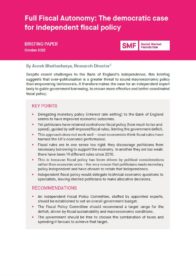Despite recent challenges to the Bank of England’s independence, this briefing suggests that over-politicisation is a greater threat to sound macroeconomic policy than empowering technocrats. It therefore makes the case for an independent expert body to guide government borrowing, to ensure more effective and better coordinated fiscal policy.
KEY POINTS
- Delegating monetary policy (interest rate setting) to the Bank of England seems to have improved economic outcomes.
- Yet politicians have retained control over fiscal policy (how much to tax and spend), guided by self-imposed fiscal rules, limiting the government deficit.
- This approach does not work well – most economists think fiscal rules have harmed the UK’s economic performance.
- Fiscal rules are in one sense too rigid: they discourage politicians from necessary borrowing to support the economy. In another they are too weak: there have been 14 different rules since 2010.
- This is because fiscal policy has been driven by political considerations rather than economic ones – the very reason that politicians made monetary policy independent and have chosen to retain that independence.
- Independent fiscal policy would delegate technical economic questions to specialists, leaving elected politicians to make allocative decisions.
RECOMMENDATIONS
- An independent Fiscal Policy Committee, staffed by appointed experts, should be established to set an overall government budget.
- The Fiscal Policy Committee should recommend a target range for the deficit, driven by fiscal sustainability and macroeconomic conditions.
- The government should be free to choose the combination of taxes and spending it favours to achieve that target.

DOWNLOAD THE BREIFING PDF
